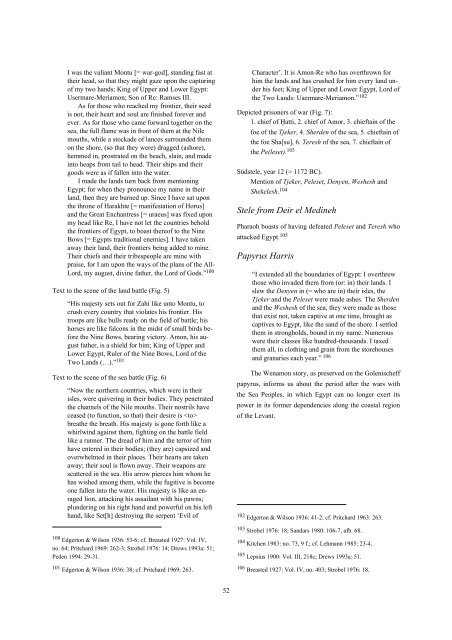The Ethnicity of the Sea Peoples - RePub - Erasmus Universiteit ...
The Ethnicity of the Sea Peoples - RePub - Erasmus Universiteit ...
The Ethnicity of the Sea Peoples - RePub - Erasmus Universiteit ...
You also want an ePaper? Increase the reach of your titles
YUMPU automatically turns print PDFs into web optimized ePapers that Google loves.
I was <strong>the</strong> valiant Montu [= war-god], standing fast at<br />
<strong>the</strong>ir head, so that <strong>the</strong>y might gaze upon <strong>the</strong> capturing<br />
<strong>of</strong> my two hands; King <strong>of</strong> Upper and Lower Egypt:<br />
Usermare-Meriamon; Son <strong>of</strong> Re: Ramses III.<br />
As for those who reached my frontier, <strong>the</strong>ir seed<br />
is not, <strong>the</strong>ir heart and soul are finished forever and<br />
ever. As for those who came forward toge<strong>the</strong>r on <strong>the</strong><br />
sea, <strong>the</strong> full flame was in front <strong>of</strong> <strong>the</strong>m at <strong>the</strong> Nile<br />
mouths, while a stockade <strong>of</strong> lances surrounded <strong>the</strong>m<br />
on <strong>the</strong> shore, (so that <strong>the</strong>y were) dragged (ashore),<br />
hemmed in, prostrated on <strong>the</strong> beach, slain, and made<br />
into heaps from tail to head. <strong>The</strong>ir ships and <strong>the</strong>ir<br />
goods were as if fallen into <strong>the</strong> water.<br />
I made <strong>the</strong> lands turn back from mentioning<br />
Egypt; for when <strong>the</strong>y pronounce my name in <strong>the</strong>ir<br />
land, <strong>the</strong>n <strong>the</strong>y are burned up. Since I have sat upon<br />
<strong>the</strong> throne <strong>of</strong> Harakhte [= manifestation <strong>of</strong> Horus]<br />
and <strong>the</strong> Great Enchantress [= uraeus] was fixed upon<br />
my head like Re, I have not let <strong>the</strong> countries behold<br />
<strong>the</strong> frontiers <strong>of</strong> Egypt, to boast <strong>the</strong>re<strong>of</strong> to <strong>the</strong> Nine<br />
Bows [= Egypts traditional enemies]. I have taken<br />
away <strong>the</strong>ir land, <strong>the</strong>ir frontiers being added to mine.<br />
<strong>The</strong>ir chiefs and <strong>the</strong>ir tribespeople are mine with<br />
praise, for I am upon <strong>the</strong> ways <strong>of</strong> <strong>the</strong> plans <strong>of</strong> <strong>the</strong> All-<br />
Lord, my august, divine fa<strong>the</strong>r, <strong>the</strong> Lord <strong>of</strong> Gods.” 100<br />
Text to <strong>the</strong> scene <strong>of</strong> <strong>the</strong> land battle (Fig. 5)<br />
“His majesty sets out for Zahi like unto Montu, to<br />
crush every country that violates his frontier. His<br />
troops are like bulls ready on <strong>the</strong> field <strong>of</strong> battle; his<br />
horses are like falcons in <strong>the</strong> midst <strong>of</strong> small birds before<br />
<strong>the</strong> Nine Bows, bearing victory. Amon, his august<br />
fa<strong>the</strong>r, is a shield for him; King <strong>of</strong> Upper and<br />
Lower Egypt, Ruler <strong>of</strong> <strong>the</strong> Nine Bows, Lord <strong>of</strong> <strong>the</strong><br />
Two Lands (…).” 101<br />
Text to <strong>the</strong> scene <strong>of</strong> <strong>the</strong> sea battle (Fig. 6)<br />
“Now <strong>the</strong> nor<strong>the</strong>rn countries, which were in <strong>the</strong>ir<br />
isles, were quivering in <strong>the</strong>ir bodies. <strong>The</strong>y penetrated<br />
<strong>the</strong> channels <strong>of</strong> <strong>the</strong> Nile mouths. <strong>The</strong>ir nostrils have<br />
ceased (to function, so that) <strong>the</strong>ir desire is <br />
brea<strong>the</strong> <strong>the</strong> breath. His majesty is gone forth like a<br />
whirlwind against <strong>the</strong>m, fighting on <strong>the</strong> battle field<br />
like a runner. <strong>The</strong> dread <strong>of</strong> him and <strong>the</strong> terror <strong>of</strong> him<br />
have entered in <strong>the</strong>ir bodies; (<strong>the</strong>y are) capsized and<br />
overwhelmed in <strong>the</strong>ir places. <strong>The</strong>ir hearts are taken<br />
away; <strong>the</strong>ir soul is flown away. <strong>The</strong>ir weapons are<br />
scattered in <strong>the</strong> sea. His arrow pierces him whom he<br />
has wished among <strong>the</strong>m, while <strong>the</strong> fugitive is become<br />
one fallen into <strong>the</strong> water. His majesty is like an enraged<br />
lion, attacking his assailant with his pawns;<br />
plundering on his right hand and powerful on his left<br />
hand, like Set[h] destroying <strong>the</strong> serpent ‘Evil <strong>of</strong><br />
100 Edgerton & Wilson 1936: 53-6; cf. Breasted 1927: Vol. IV,<br />
no. 64; Pritchard 1969: 262-3; Strobel 1976: 14; Drews 1993a: 51;<br />
Peden 1994: 29-31.<br />
101 Edgerton & Wilson 1936: 38; cf. Pritchard 1969: 263.<br />
52<br />
Character’. It is Amon-Re who has overthrown for<br />
him <strong>the</strong> lands and has crushed for him every land under<br />
his feet; King <strong>of</strong> Upper and Lower Egypt, Lord <strong>of</strong><br />
<strong>the</strong> Two Lands: Usermare-Meriamon.” 102<br />
Depicted prisoners <strong>of</strong> war (Fig. 7):<br />
1. chief <strong>of</strong> Hatti, 2. chief <strong>of</strong> Amor, 3. chieftain <strong>of</strong> <strong>the</strong><br />
foe <strong>of</strong> <strong>the</strong> Tjeker, 4. Sherden <strong>of</strong> <strong>the</strong> sea, 5. chieftain <strong>of</strong><br />
<strong>the</strong> foe Sha[su], 6. Teresh <strong>of</strong> <strong>the</strong> sea, 7. chieftain <strong>of</strong><br />
<strong>the</strong> Pe(leset). 103<br />
Südstele, year 12 (= 1172 BC).<br />
Mention <strong>of</strong> Tjeker, Peleset, Denyen, Weshesh and<br />
Shekelesh. 104<br />
Stele from Deir el Medineh<br />
Pharaoh boasts <strong>of</strong> having defeated Peleset and Teresh who<br />
attacked Egypt. 105<br />
Papyrus Harris<br />
“I extended all <strong>the</strong> boundaries <strong>of</strong> Egypt: I overthrew<br />
those who invaded <strong>the</strong>m from (or: in) <strong>the</strong>ir lands. I<br />
slew <strong>the</strong> Denyen in (= who are in) <strong>the</strong>ir isles, <strong>the</strong><br />
Tjeker and <strong>the</strong> Peleset were made ashes. <strong>The</strong> Sherden<br />
and <strong>the</strong> Weshesh <strong>of</strong> <strong>the</strong> sea, <strong>the</strong>y were made as those<br />
that exist not, taken captive at one time, brought as<br />
captives to Egypt, like <strong>the</strong> sand <strong>of</strong> <strong>the</strong> shore. I settled<br />
<strong>the</strong>m in strongholds, bound in my name. Numerous<br />
were <strong>the</strong>ir classes like hundred-thousands. I taxed<br />
<strong>the</strong>m all, in clothing and grain from <strong>the</strong> storehouses<br />
and granaries each year.” 106<br />
<strong>The</strong> Wenamon story, as preserved on <strong>the</strong> Golenischeff<br />
papyrus, informs us about <strong>the</strong> period after <strong>the</strong> wars with<br />
<strong>the</strong> <strong>Sea</strong> <strong>Peoples</strong>, in which Egypt can no longer exert its<br />
power in its former dependencies along <strong>the</strong> coastal region<br />
<strong>of</strong> <strong>the</strong> Levant.<br />
102 Edgerton & Wilson 1936: 41-2; cf. Pritchard 1963: 263.<br />
103 Strobel 1976: 18; Sandars 1980: 106-7, afb. 68.<br />
104 Kitchen 1983: no. 73, 9 f.; cf. Lehmann 1985: 23-4.<br />
105 Lepsius 1900: Vol. III, 218c; Drews 1993a: 51.<br />
106 Breasted 1927: Vol. IV, no. 403; Strobel 1976: 18.

















